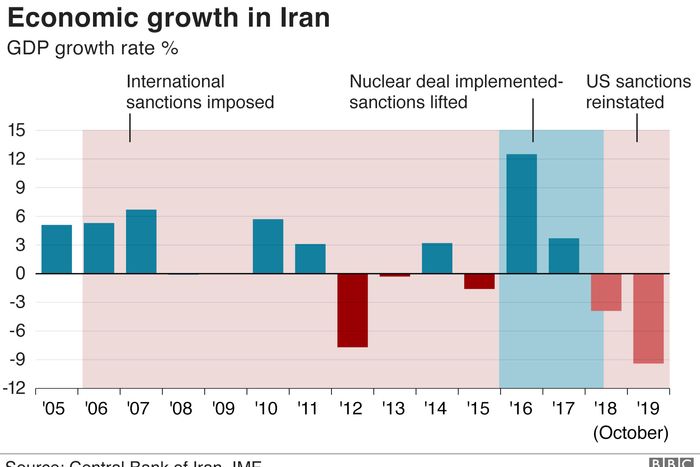
The U.S. Congress has not declared war on Iran. And yet, last week the U.S. government deliberately killed a top Iranian military official; which is to say, it committed an unambiguous act of war against a sovereign nation-state without congressional authorization.
That is not normal. True, America has long comported itself less as the “world’s policeman” than as its gun-running vigilante. But even by our nation’s own (lawless) standards, taking out a high-ranking military officer of an internationally recognized foreign government is beyond the pale: Last week’s strike on Iranian general Qasem Soleimani marked the first time since the Second World War that the U.S. had “killed a major military leader in a foreign country,” according to the New York Times.
The Trump administration felt compelled to justify its extraordinary measure by invoking extraordinary circumstances. Officially, the president did not order the assassination of a foreign official to exact retribution for past attacks on U.S. soldiers, or deter Iranian aggression in the region in some generalized sense. Rather, according to the White House, the United States dropped several missiles on the Iranian commander because doing so was the only possible means of averting an “imminent” attack on Americans abroad.
This “imminent” attack would have transpired in a matter of “days” and/or “weeks,” and killed “dozens if not hundreds” of Americans, along with some unspecified number of Europeans. The intelligence informing these assessments is “clear and unambiguous” (but the supposedly sovereign public of our great democracy is not allowed to see it).
There is, of course, precedence for Republican administrations launching Middle Eastern wars on the basis of lies. But historically, such administrations have felt compelled to keep up the pretense of democratic accountability. George W. Bush & Co. put in the effort to fabricate a logically coherent casus belli for Iraq and manufacture intelligence backing up their mendacious claims. The Trump White House, by contrast, has not even done voters the courtesy of pretending to believe that they are entitled to a facially plausible narrative — or evidence of any kind — before their government launches wars in their name.
Senate Democrats have asked the administration to declassify the rationale for the Soleimani killing that it had provided to Congress. “It is critical that national security matters of such import be shared with the American people in a timely manner,” Senate Minority Leader Chuck Schumer and ranking member of the Senate Foreign Relations Committee Bob Menendez wrote in a letter. “An entirely classified notification is simply not appropriate in a democratic society, and there appears to be no legitimate justification for classifying this notification.”
There does, however, appear to be an illegitimate one. Contrary to the claims made by Joint Chiefs of Staff chairman Mark A. Milley, the classified intelligence supporting the administration’s case is neither “clear” nor “unambiguous,” according to just about every official and lawmaker who’s been made privy to it. From the Washington Post:
Lawmakers left classified briefings with U.S. intelligence officials on Friday saying they heard nothing to suggest that the threat posed by the proxy forces guided by Soleimani had changed substantially in recent months.
… Some defense officials said Pompeo’s claims of an imminent and direct threat were overstated, and they would prefer that he make the case based on the killing of the American contractor and previous Iranian provocations.
Sources who spoke with the New York Times told a similar story:
According to one United States official, the new intelligence indicated “a normal Monday in the Middle East” — Dec. 30 — and General Suleimani’s travels amounted to “business as usual.”
That official described the intelligence as thin and said that General Suleimani’s attack was not imminent because of communications the United States had between Iran’s supreme leader, Ayatollah Ali Khamenei, and General Suleimani showing that the ayatollah had not yet approved any plans by the general for an attack. The ayatollah, according to the communications, had asked General Suleimani to come to Tehran for further discussions at least a week before his death.
CNN, meanwhile, offers this point–counterpoint from Democratic and Republican sources who were briefed on the administration’s intelligence:
[I]n an interview with CNN last week, Democratic Sen. Tom Udall of New Mexico said more than once that he does not believe an attack on the United States was imminent as Trump and other top administration officials have said.
“My staff was briefed by a number of people representing a variety of agencies in the United States government and they came away with no feeling that there was evidence of an imminent attack,” Udall said.
A Republican congressional source familiar with the administration’s decision to strike Soleimani acknowledged that in the past, the President “has been reluctant to take military action.” In this case, the killing of an American contractor, the wounding of others, and the subsequent embassy protests “crossed his line.” His advisers also pointed out to the President that if he “didn’t respond now, they (Iran) will continue to cross it.”
Attentive readers will notice that the Republican congressional source does not affirm the administration’s official rationale, but rather, directly contradicts it: The president did not kill Soleimani to preempt an imminent attack, but to avenge the killing of an American contractor and/or deter Iranian aggression in a generalized sense. This is consistent with separate reports that suggest the Pentagon presented Trump with the option of targeting Soleimani “mainly to make other options” for punishing an Iranian militia’s alleged attack on an Iraqi military base “seem reasonable.” In other words, the idea for the strike did not arise from intelligence demonstrating a credible, specific threat, but merely from Pentagon officials’ attempts to conjure a “galaxy brain” response to past Iranian provocations.
But all these reports are almost beside the point. You don’t need to assess any underlying evidence to reject a claim that is nonsensical on its face. The administration has openly admitted that the attack in question was not “imminent” by any reasonable definition. Asked when Soleimani’s attack was set to occur, Milley said Friday, “days, weeks.” Asked on Sunday which was it — days or weeks — Secretary of State Mike Pompeo responded indignantly, “If you’re an American in the region, days and weeks — this is not something that’s relevant.”
If you are an American who does not want your government to lie to you, however, this detail is quite relevant indeed. To state what should be obvious, an attack can either be weeks away from execution, or it can be imminent, but it cannot be both.
This is not a semantic quibble. If Soleimani was not literally about to carry out a fatal attack on Americans — if he was merely in the process of orchestrating an attack set to take place sometime next month — then how, precisely, would killing him even avert the attack in question? Why would taking out a single general render a nation-state incapable of moving forward with an attack that was already so well-prepared as to be practically “imminent”?
The only halfway coherent answer is that Trump’s brazen escalation is sure to shock and awe Tehran into timidity; with Soleimani dead, Iran will lack the nerve to follow through on his plot. This is the logic that the administration’s apologists have largely embraced. But there are two glaring problems with the argument, the biggest being that the administration itself manifestly does not buy it. If the White House actually believed that assassinating Soleimani made future attacks on U.S. installations in the Middle East less likely, then it would not have just suspended operations against ISIS in order to reassign U.S. troops to guard duty at American bases in Iraq.
The second problem with the White House’s argument is that there were quite clearly alternative means for “de-escalating” tensions with Iran. For example, the U.S. could have stopped strangling the Iranian economy in direct violation of an international agreement our nation committed to just four years ago. Despite Iran’s compliance with the 2015 nuclear agreement — and the desire of our core European allies to uphold it — the U.S. has imposed draconian sanctions on both Iran and any European firm that dares to invest in it. As a result, Iran’s economy is now mired in a devastating recession. Its currency has halved in value. For ordinary Iranians, the cost of living has skyrocketed; for many seriously ill Iranians, the cost of lifesaving medications has proven prohibitive. If the Iranian regime is a rational actor that responds to incentives, as the case for deterring its aggression through targeted assassination tacitly presumes, then it is unclear why the regime could not be similarly influenced by an offer of economic peace.
That said, you don’t need to believe in the wisdom of the Iran nuclear agreement to object to the administration’s rationale for killing Soleimani. You just need to believe that your government should not feel entitled to tell you blatant lies in any context, let alone in the context of war and peace.
As of 11 years ago, this was a premise that even Donald Trump could endorse. In a 2008 interview with CNN, Trump said that he had wanted Congress to “impeach Bush and get him out of office.” Asked why he believed George W. Bush deserved to be impeached, the mogul replied, “He lied. He got us into the war with lies.”
On this one subject, let’s hope the Senate takes Trump’s counsel.































